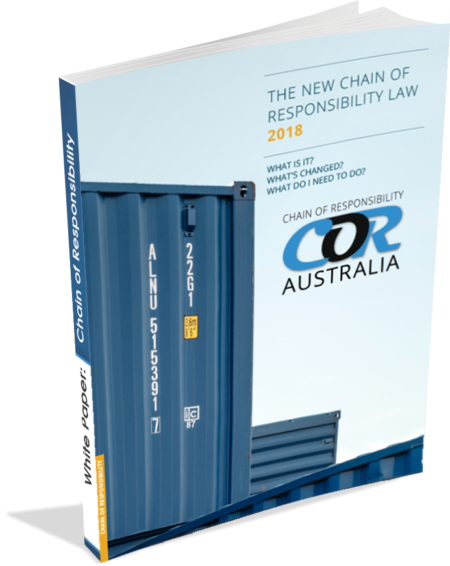Under the Chain of Responsibility (CoR) and National Heavy Vehicle (NHVL) laws, everyone in the supply chain must take ‘every reasonably practicable measure’ to ensure the safety of their employees, contractors, customers and visitors. This includes all aspects covered under Chain of Responsibility legislation, including the requirement to prevent driver fatigue and ensure a driver does not drive a heavy vehicle while impaired by fatigue – an approach also consistent with existing Occupational Health & Safety (OHS) laws.
To get a thorough understanding of CoR Legislation, download our FREE White Paper “The New Chain of Responsibility Law” (compliant with changes made in 2018).
 Employers and customers will be held accountable for dangerous work schedules and long truck queues, which are known to be major causes of fatigue. If poor business practices endanger the lives of other road users, there will be severe penalties for those responsible.
Employers and customers will be held accountable for dangerous work schedules and long truck queues, which are known to be major causes of fatigue. If poor business practices endanger the lives of other road users, there will be severe penalties for those responsible.
Penalties escalate sharply for offences which pose a serious road safety risk and may include court-imposed fines of up to $20,000 and demerit points. Pointing the finger at someone else who has broken the law does not automatically mean you are no longer responsible.
In some circumstances, you may have multiple duties under the Chain of Responsibility and are therefore also liable.
To comply with the CoR laws, you should ensure that you can demonstrate reasonable steps were taken to prevent a breach from occurring in your workplace or as a result of your activities.
There are no limits to the ways in which you can do this. What constitutes reasonable steps will vary according to each individual’s circumstances. You may need to change the way you do business on a daily basis.
Taking reasonable steps could include:
- Developing an industry code of practice
- Use of accreditation schemes
- Reviewing your business practices
- Changing your commercial arrangements
- Adopting a risk management approach
If you exercise control or influence over the transport task in your workplace you can be held legally liable for your actions, inactions or demands if they have caused or contributed to a road safety breach. The law requires you to take reasonable steps to prevent your conduct from causing or contributing to a breach. In addition, the law also prohibits you from:
- Making demands that you know or ought to know would cause a breach
- Entering into contracts that you know or ought to know would cause, encourage or give an incentive for a breach
- Coercing, inducing or encouraging breaches
- Passing on false or misleading information that could cause a breach
With the advent of the National Heavy Vehicle Laws, Australians can expect a consistent administration of the heavy Vehicle laws by the National Heavy Vehicle Regulator (NHVR), except for Western Australia. The NHVR will rely on local enforcement agency /regulator, such as police, transport and OHS.
Consistent with the National OHS Laws, the CoR Laws provide clear guidance on what steps can be taken by a CoR party to manage their CoR compliance.
By taking these “reasonably practicable measures” and operating within the law, parties can:
- Reduce the chance of a death or injury occurring
- Reduce the likelihood of fines (up to $20,000.00 per offence in some cases)
- Reduce the likelihood major damage to infrastructure and subsequent liability for rectification
- And where a death or injury occurs, increase the chance of successfully defending a prosecution for breach of a CoR law
For more information on how our services and/or training can assist your company please contact us here.
